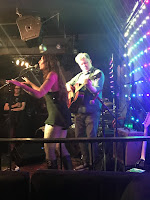Puma Perl’s Pandemonium, 6/21/19, Bowery Electric, NYC
Performance review by John Pietaro
 |
| Puma Perl & Friends |
The spirit of downtown past was on raucous display at
Bowery Electric on June 21, once again under the guiding hand of Puma Perl, denizen
of this hallowed corner at Joey Ramone Place. While the Bowery of old has
fallen under the thicket of high-priced restaurants and luxury buildings
commanding the once infamous strip, real New York, equal parts LES community
and outsider arts ingenuity, has survived the maelstrom. At least in quarters
such as this, yards from the sad carcass of CBGB and the phantom hindsight of
Max’s, Club 82, Mercer Arts, the Mudd Club, the Tin Palace. Could Joey have
ever envisioned that his name would hover East 2nd Street? For most
of us in the house, there’s no rest until street sign dedications proclaim a Punk
Place, Richard Hell Way, Patti Smith Street, Lydia Lunch Lane and Basquiat
Avenue, for a start.
Puma Perl is most identified with punk verse, but rather
than an artform grown in the midst of the melee, hers predates the turning new wave,
growing along with venues like the Nuyorican Poets Café. Perl’s quarterly events
at the Bowery Electric, the Pandemoniums, debuted in 2012. It’s easiest to
think of these very hip showcase/parties as Village arts salons strained though
rocking energy, dry humor and artful rebellion--a “Die Yuppie Scum”, if you
will, for the Trump years. This latest Pandemonium featured poetry of not only
the post-punk sort, but neo-Brecht, neo-Beat and with bits of slam alternating
driving, moving and alluring music.
 |
| Rick Eckerle & co |
He was followed by the emotive performance poets Annie Petrie (best line: “Mercury, go fuck yourself”) and San Franciscan KR Morrison who offered fine radical feminist pieces that are utterly necessary in this age of the Gorsuch court. Petrie, who later said she was in the mud at the original Woodstock, wore sunglasses and latter-day rainbows, but it was Morrison, of a considerably later generation, who embraced the retro-hippie vision with long straight hair and flowy outfit. For the hardcore folks in attendance, her militance was assured by way of shaved temples contrasting the Baez-do, but both poets reminded the house of the need to maintain outrage in times such as these.
Cait O’Riordan, former Pogues bassist, next performed a
lilting acoustic guitar/vocal duet with Kath Green and then stand-up comic
Susan Jeremy tore up the night with a timely set of LGBTQ+ hysterics. Bringing
the edgy rock back into focus, NY Junk members Joe Sztabnik and Jeff Ward
punched out the raunch before the evening’s host took the stage with Puma Perl
& Friends. This ensemble magically blended provocative inner city spoken
word, including moving reminiscence of Coney Island, with the best in fire
music strained through thoughtful, tuneful arrangements. The front line of
Perl, tenor saxophonist Danny Ray (seriously blue bar-walker, even if stationary
throughout), screaming, shimmering, celebrated electric violinst Walter Steding
(a Warhol protégé) mixed it up most artfully with guitarist Joff Wilson and it
was all contained by Sztabnik’s bass and Dave Donen’s drums. This band is not
to be missed.
 |
| Steve Dalachinsky |
 |
| Jane LeCroy & Tom Abbs |
 |
| Soul Cake |







